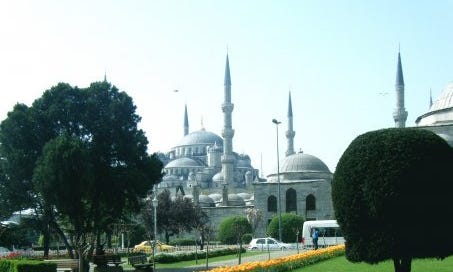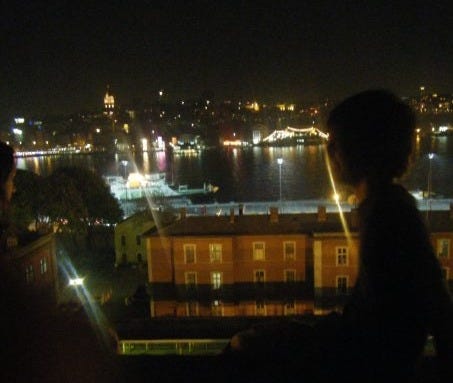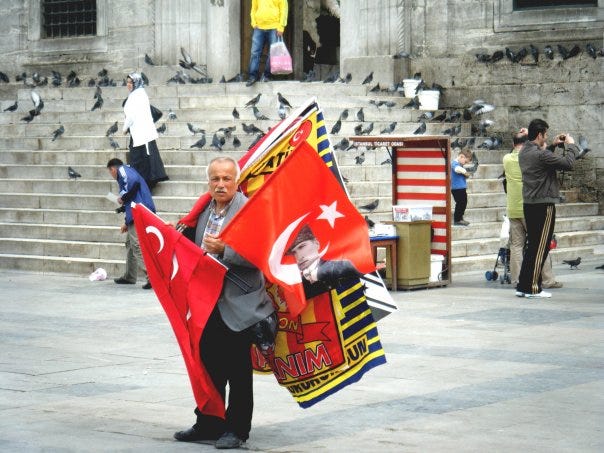The first time I left the continent of North America, I had recently turned eighteen and was in my final year of high school. One afternoon, our physics teacher, Mr. V, approached me with an unexpected question: would I be interested in joining a school trip he was planning to his homeland, Istanbul, Turkey? I was taking an Islamic Studies seminar taught by my best friend’s mother (who also happened to be one of the school’s math teachers), which I assumed was how I ended up on his radar for the excursion.
My school boasted this kind of creative overlap in the literature it sent to prospective students. As a small private academy, teachers (and students!) could shape classes and organize trips around their own passions. It operated more like a liberal arts college than a typical high school. Here, we didn’t lock our lockers, we didn’t take standardized tests (or any tests at all, really), and respectful debating with instructors was commonplace, even encouraged. We were free to explore a “wellness” trail through the school grounds whenever we needed a break. And the open art studio (complete with the school’s cat, Georgia O’Kitty) was my sanctuary, where I ate my lunch and spent all my free periods.
So, Mr. V planning an expedition to Turkey didn’t strike anyone as unusual. Looking back, it might also have been a clever way for him to finance his ticket home.
Turkey is a bold first passport stamp, especially so young and with only the lightest supervision; our chaperones were two brilliant teachers who were not exactly attentive. Before I left, my father made me watch Midnight Express—his version of a cautionary tale. (Don't smuggle drugs in Turkey—got it!)
He dropped me off at the airport, and I joined the handful of students and our two chaperones. After nearly twenty hours of plane-hopping, cramped seats, juggling luggage, and floppy airline food, we finally arrived in Istanbul—jet-lagged, rumpled, and blinking in the bright light of a new world. As we stepped off the bus outside our hotel, we were greeted with Istanbul’s version of “Ciao, bella!”
“Show me your bobs!” a man shouted in fragmented English at me and the other girls.
A crude welcome, sure—but also an instant education in what it means to be young, foreign, and female. Over the next two decades of solo travel, I would dodge lewd propositions, brush off unwanted advances, and physically shove away grabby men in nightclubs, on crowded sidewalks, and in subway tunnels.
Our guide, Volkan—a suave young Turkish man with slicked-back black hair who modeled his style after classic Hollywood films — led us not only through the city, but through centuries, through a place layered with as many chapters as it’s had invaders and rulers. Roman foundations, Byzantine mosaics, Ottoman arches, Arabic scripts—history and modern tension spread out around us like a magician’s fan of cards.
Straddling the continents of Asia and Europe, Istanbul is a city suspended between worlds, a trapeze act balancing ethos and ideology.
A former imperial capital under the Romans, Byzantines, and Ottomans, it holds architectural echoes of basilicas and mosques, palaces and bazaars. It bears Roman columns, Ottoman domes, European cafés, and glassy modern malls, etched across verdant hills cradling the Bosphorus.
There's palpable yearning to be seen by the West as modern, progressive, and desirable, while remaining bound by history, faith, and geography to the East. It is a city roosted on the intersection of time and tension.
Looking back nearly twenty years removed (it feels impossible to me it was that long ago), the facts have softened, but visions of the visit remain, like flowers pressed between pages.
Ice cream stands with vendors serving cups of stretchy dondurma in a rainbow of colors. Towering mosques with dizzying tile-work. Terraced white-marble cemeteries clinging to quiet hillsides. A boat ride along the Bosphorus, gulls trailing overhead, while the continents waved to one another across the strait. Spice-scented markets pulsing with the rhythm of haggling voices. Tulip gardens in full bloom, rivaling Amsterdam. The Adhan or call to prayer resounding like a storm wind that hushes a forest. Stray cats sauntering unbothered through ancient alleyways, stopping at porches for offerings of cat food on communal paper plates.
In the courtyards of sun-drenched mosques, I watched men in flowing shalwar and tunics walk arm-in-arm, their faces serene. Sidewalk cafés spilled into the streets, oddly familiar. We drank honeyed tea and sharp espresso while groups of young people laughed at jokes in a language we didn’t understand.
At the Blue Mosque, I washed my hands and feet at the fountains outside, wrapped a hijab around my head with a shawl I'd brought from home exactly for this purpose, and stepped into the subdued hush of worship.
Across the square, in Hagia Sophia, history is layered like stone sediment. Built as a Greek Orthodox cathedral in the sixth century and later transformed into a mosque, it carries the weight of empires in its walls. Beneath its domes, Greek liturgy once reverberated in Constantinople’s native tongue, later replaced by Quranic recitation. The faces of Mary and Jesus still gaze down from golden mosaics in the apse—remnants of its Christian past—now flanked by monumental Arabic calligraphy praising Allah and the Prophet.
Scratched into the marble: graffiti, an otherwise disappointing find, except it wasn’t from recent visitors, but instead etched by Norse mercenaries serving in the Byzantine guard. Bored or boastful, they etched runes into the stone nearly a thousand years ago.
At a traditional Turkish bath, I opted to lean into the authentic experience by stripping completely nude. After a quick shower, I probed my way through the steam toward a communal slab of warm marble. I stretched out on the stone, gazing up at diodes of light peeking through the pierced dome above—a thousand years of light shining down on thousands of bodies like mine, laid bare and mollified. It was easier to dissolve into the moment at eighteen than it would be now.
A squat Turkish woman, as naked as I was, clapped a wrinkled hand on my arm and dragged me to my fate: a scrubbing. With strong arms, she coated me in soap and, using a coarse mitt, began exfoliating my body efficiently and thoroughly.
Eyes closed, suds clinging to my face, I felt her hands lather every inch of skin, including the rivets between my toes and fingers. Then, without warning, a bucket of ice-cold water splashed over me, shocking my doughy, limp body into a gasp.
With a quick swipe of her thumbs, she cleared the foam from my eye sockets. I blinked—reborn.
She smacked my tush to send me along, and I stumbled off to the showers to rinse, redress, and step back out into the world, which now felt crisper, brighter, and refreshingly new.
Afterward, Mr. V asked us about the bath, prompting a deeper reflection on the intersections between American cultural norms and Islamic modesty. I shared my perspective as one of the few who entered without a bathing suit. As Mr. V later explained, this was part of why I’d made the shortlist of prospective travelers. It wasn’t my enrollment in the Islamic Studies course, but his belief that I would approach the trip with open-hearted curiosity, unburdened by the filters of cultural bias. Not simply a tourist, he said, but what he called an earnest guest: someone who visits as a participant, with enthusiasm, humility, and a willingness to be changed.
On one of our final nights, another senior and I conspired to sneak out of the hotel for a beer and a hookah. Technically legal, our teachers made it clear they couldn’t be complicit in any tobacco or alcohol use, though I remember their warning coming with something close to a wink. After the chaperones had gone to bed, we slipped quietly from our rooms and met Volkan on the corner, our guide turned clandestine accomplice.
As we lingered on the sidewalk outside the hotel near the intracity trolley tracks, tossing around ideas for where to go, Volkan slipped a quick hand around my waist and pulled me sharply toward him. The cable car barreled past, close enough to ruffle my hair. I’d been standing too close to the rail, and he’d saved me from both a bruised body and a bruised ego. Unfazed and without stumbling, he continued scheming, and finally, with a shrug, escorted us to a nearby bar.
Volkan ordered for us a round of Turkish beer in hefty glass mugs and a hookah. We passed the pipe between us, the air thick with apple-scented smoke, sipping cold, foamy beer and talking about the startling similarities between East and West—and the state of Turkey suspended in between.
At the time, Islamophobia was rampant in America. I remember the comments I received when I mentioned taking an Islamic Studies class or that I was traveling to a Muslim-majority country. There was immediate fear and concern, rooted in ignorance.
In that bar with Volkan, sipping steins of hoppy beer and passing a pipe, we could have been as easily in Germany or France, surrounded by young people laughing after a long day at work.
What a gift to see the world with eyes wide open, to lose myself among people, to slip into a hijab for a moment, and feel my place from somewhere entirely different, to be an earnest guest in someone else's home.
Travel gifts you with an experience that often conflicts with your comfort, if you’re doing it right. It argues with your sense of normality. It demands you shed your ego in pursuit of perspective.
For the past twenty years, I’ve been chasing little moments abroad, eager for stirring experiences, connections that stretch beyond time, and the magic of modern places built on ancient worlds—hoping to embody the spirit of an earnest guest, not just a tourist.
The road has been uneven, a little wild, with legends underfoot and ghosts in the doorways, but it always seems to lead to a table set with a good meal and a story to share.









